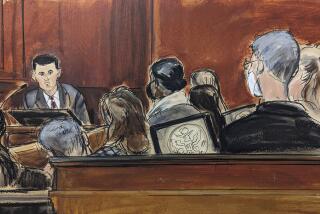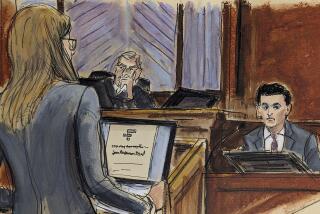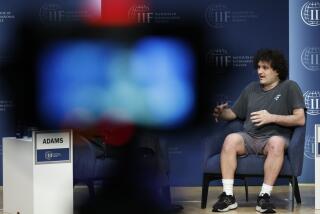Ex-Aide Claims Keating Asked: ‘Can We Cheat?’ : Thrifts: Former Lincoln president testifies that question related to curbs on junk bond sales.
- Share via
Stung by restrictions on junk bond sales four months before his Lincoln Savings was seized, Charles H. Keating Jr. responded by asking, “Can we cheat?,” former Lincoln President Raymond C. Fidel testified Tuesday.
Keating made his comment in December, 1988, when Fidel ordered employees at Lincoln branches to stop referring customers to sellers of junk bonds issued by Keating’s American Continental Corp., Lincoln’s parent, Fidel said.
Regulators had already forced ACC bond sellers not to operate in Lincoln branches. Now, Fidel testified, the regulators wanted no mention made at all of the ACC bonds in the branches. Within a week, junk bond sales dropped precipitously, prompting a call to Fidel from Keating.
“His response to me was, ‘Can we cheat?’ ” Fidel said.
He said he called one of Keating’s lawyers and was told to “stay on track with what we were doing.”
In opening statements at Keating’s fraud trial, prosecutors said the bond sales were nothing more than an elaborate Ponzi scheme to cover up huge losses at Keating’s companies. Lincoln’s collapse in April, 1989, was the costliest thrift debacle in history.
Keating’s attorney, Stephen C. Neal, said his client had done nothing illegal, using the best attorneys to set up the bond sales. Keating was a victim of vindictive regulators who hounded him out of business and of his own tendency to make unfortunate, flip remarks, Neal suggested.
Fidel also testified about how Keating ran an investment trading room at ACC headquarters jammed with color monitors tracking investments and a “black box” telling him when to buy and sell European investments.
Once, after Keating advised an aide not to sell an investment even though it was declining in value, Keating blew into his hands and rubbed them as if tossing dice, and said, “If only everybody knew,” Fidel testified.
Fidel also said he believed that he had done wrong by creating a program to directly link high junk bond sales at Lincoln branches to prizes for branch employees.
He said Keating never disciplined or reprimanded him for the program, which Keating’s lawyers shut down a week after it began in April, 1987.
Instead, Keating repeatedly called him a “genius” because bond sales went so well. Within five months, Keating boosted Fidel’s yearly pay to $325,000, a $100,000 raise, and promoted him from vice president to president of the Irvine-based S&L;, Fidel said.
Fidel, portrayed by prosecutors as Keating’s puppet, was 29 at the time.
Keating faces 20 fraud counts for allegedly duping investors about the safety of bonds sold by his American Continental Corp., a land development company through which he bought Lincoln. About $250 million in ACC bonds became worthless when ACC collapsed into bankruptcy and Lincoln was seized.
Regulators estimate the bailout cost to taxpayers at $2.6 billion.
Fidel, the day-to-day manager of the bond sales, has pleaded guilty to securities fraud charges similar to those Keating faces. He is cooperating with prosecutors in hopes of a receiving a light sentence.
He described how Keating and top aides at ACC’s headquarters in Phoenix carefully set up the program to sell bonds directly to Lincoln customers beginning in late 1986.
Among other things, he said, Keating’s lawyers stressed that all buyers were to receive prospectuses describing the bonds’ risks. The lawyers emphasized that the bonds were uninsured and that sellers should consider whether they were suitable investments for Lincoln investors who previously had purchased government-insured certificates of deposit.
Prosecutors maintain that those protections later were largely ignored as Keating, who needed fresh capital for his struggling ACC, pushed for more and more bond sales at any cost.
More to Read
Inside the business of entertainment
The Wide Shot brings you news, analysis and insights on everything from streaming wars to production — and what it all means for the future.
You may occasionally receive promotional content from the Los Angeles Times.










